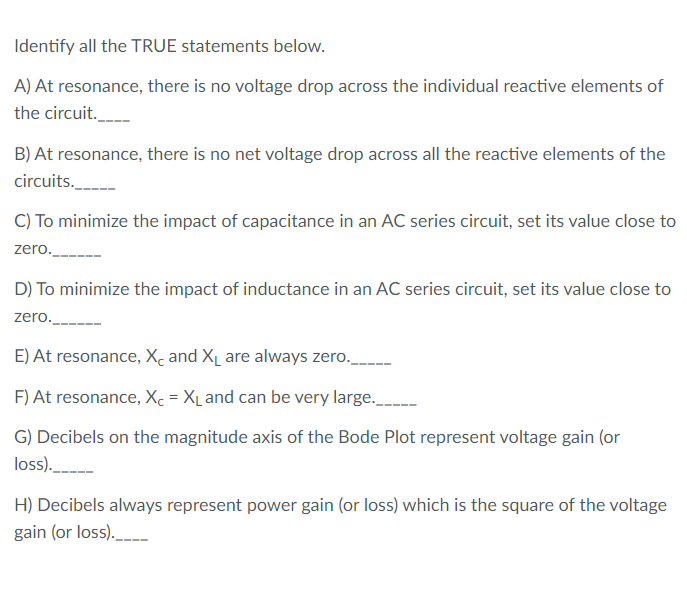Identify all the TRUE statements below. A) At resonance, there is no voltage drop across the individual reactive elements of the circuit._ B) At resonance, there is no net voltage drop across all the reactive elements of the circuits. C) To minimize the impact of capacitance in an AC series circuit, set its value close to zero.
Identify all the TRUE statements below. A) At resonance, there is no voltage drop across the individual reactive elements of the circuit._ B) At resonance, there is no net voltage drop across all the reactive elements of the circuits. C) To minimize the impact of capacitance in an AC series circuit, set its value close to zero.
Introductory Circuit Analysis (13th Edition)
13th Edition
ISBN:9780133923605
Author:Robert L. Boylestad
Publisher:Robert L. Boylestad
Chapter1: Introduction
Section: Chapter Questions
Problem 1P: Visit your local library (at school or home) and describe the extent to which it provides literature...
Related questions
Question

Transcribed Image Text:Identify all the TRUE statements below.
A) At resonance, there is no voltage drop across the individual reactive elements of
the circuit._
B) At resonance, there is no net voltage drop across all the reactive elements of the
circuits.
C) To minimize the impact of capacitance in an AC series circuit, set its value close to
zero.
D) To minimize the impact of inductance in an AC series circuit, set its value close to
zero.
E) At resonance, Xc and XL are always zero.
F) At resonance, Xc = X_ and can be very large.
G) Decibels on the magnitude axis of the Bode Plot represent voltage gain (or
loss).
H) Decibels always represent power gain (or loss) which is the square of the voltage
gain (or loss)._
Expert Solution
This question has been solved!
Explore an expertly crafted, step-by-step solution for a thorough understanding of key concepts.
Step by step
Solved in 3 steps with 2 images

Knowledge Booster
Learn more about
Need a deep-dive on the concept behind this application? Look no further. Learn more about this topic, electrical-engineering and related others by exploring similar questions and additional content below.Recommended textbooks for you

Introductory Circuit Analysis (13th Edition)
Electrical Engineering
ISBN:
9780133923605
Author:
Robert L. Boylestad
Publisher:
PEARSON

Delmar's Standard Textbook Of Electricity
Electrical Engineering
ISBN:
9781337900348
Author:
Stephen L. Herman
Publisher:
Cengage Learning

Programmable Logic Controllers
Electrical Engineering
ISBN:
9780073373843
Author:
Frank D. Petruzella
Publisher:
McGraw-Hill Education

Introductory Circuit Analysis (13th Edition)
Electrical Engineering
ISBN:
9780133923605
Author:
Robert L. Boylestad
Publisher:
PEARSON

Delmar's Standard Textbook Of Electricity
Electrical Engineering
ISBN:
9781337900348
Author:
Stephen L. Herman
Publisher:
Cengage Learning

Programmable Logic Controllers
Electrical Engineering
ISBN:
9780073373843
Author:
Frank D. Petruzella
Publisher:
McGraw-Hill Education

Fundamentals of Electric Circuits
Electrical Engineering
ISBN:
9780078028229
Author:
Charles K Alexander, Matthew Sadiku
Publisher:
McGraw-Hill Education

Electric Circuits. (11th Edition)
Electrical Engineering
ISBN:
9780134746968
Author:
James W. Nilsson, Susan Riedel
Publisher:
PEARSON

Engineering Electromagnetics
Electrical Engineering
ISBN:
9780078028151
Author:
Hayt, William H. (william Hart), Jr, BUCK, John A.
Publisher:
Mcgraw-hill Education,